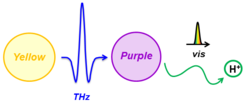Marie Skłodowska-Curie Fellowship awarded to Dr. Heejae Kim
The European Commission awarded a prestigious Marie Skłodowska-Curie Fellowship to Dr. Heejae Kim, a scientist from the Max Planck Institute for Polymer Research. In her research project, which was evaluated as excellent by the European Commission, Dr. Kim is going to explore how chemical reactions can be triggered with low-energetic Terahertz light.
Triggering of chemical reactions after absorption of light, i.e. photochemistry, is an efficient route for storing solar energy in chemicals. The most prominent example of a photochemical reaction is photosynthesis in plants where solar energy is converted to chemical energy in the form of sugar. However, such photochemical reactions typically require high-energy visible light or even ultraviolet light. In her research project Heejae is trying to push the limits of photochemical reactions by using Terahertz radiation, i.e. light with very low photon energy. With intense Terahertz laser pulses she will aim at initiating proton transport, which in turn will generate a proton gradient. Such proton gradients are efficient routes for energy storage and nature utilizes them to store and release energy in a controlled manner. In her project, Heejae will investigate the fundamental steps of such energy storage mechanism on a molecular level using ultrafast laser spectroscopy.

Heejae Kim was born in Seoul (South Korea) and studied chemistry at Korea University. She obtained her PhD in 2014 studying specific ion effects on biomolecules. In April 2014 she joined the department of Molecular Spectroscopy at the Max Planck Institute for Polymer Research in Mainz working on the fundamentals of catalysis and the development of new spectroscopic tools. The awarded fellowship will allow her to expand upon her current work.












